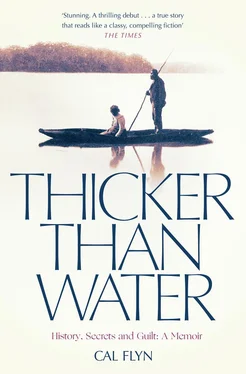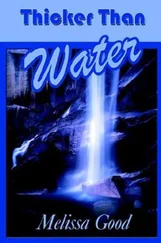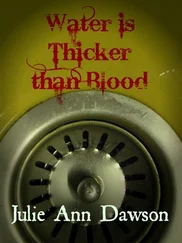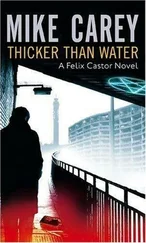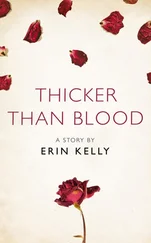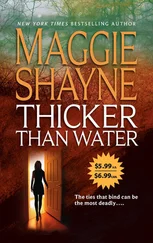It would be impossible to identify the culprits of the Macalister killing, for what separated one black from another? Each was as murderous as the next. And was not the life of a Macalister worth ten, or twenty, of the natives? The loss of a Macalister must be answered with whatever punishment was necessary to ensure that no white man would ever find harm at the hands of the blacks again.
The Highlanders were armed, organised and angry. When suddenly they came upon the Aboriginal encampment, on a flat by a waterhole nestled in a wide bend of the creek, no one needed to tell them what to do. They advanced stealthily towards the camp, fanning out in a line until they stretched between the banks of the creek on either side, like the string of a bow. It was a fine trap: when the first shots were fired there was nowhere for the Gunai tribesmen to run to.
Crack. Crack. Rifles fired into the centre of the camp, scattering men, women, children. Some of them clutched infants to their chests, as if their frail bodies could protect them from firepower.
Crack. Crack. Bullets began to rain down upon the Gunai. The screams of shock and fright would soon intermingle with the wails of the wounded.
Crack. Crack. The Scots advanced, bloodlust in their eyes. Those still able to run, ran. They ran blindly from the muzzles of the guns, tumbling down the steep banks and into the waterhole. Others made a desperate break through the line of horsemen, eyes fixed on the cover offered by the scrub beyond.
Crack. Crack. The deep water offered solace, but only temporarily. The terror and chaos were contained in another room. Underwater even the gunfire sounded different: a distant drumroll, more felt than heard, and the strange suction sounds of bullets through water.
Lungs burning, the fleeing Gunai were forced to raise their heads to breathe. As they surfaced, the Highlanders fired again. Again and again, until there was no one left to fire at.
The water was red with blood. Fresh blood, vivid and unreal. Thick and opaque, like the paint in a pot. It swirled and eddied, leaching from the corpses, flecked with a white frothy scum where the water had churned up.
When all was quiet, Angus stepped forward to inspect his men’s work. There were too many dead blacks to count: dozens of them. Warriors, shamans, hunters, gatherers, fathers, mothers, sons, daughters, infants, elders, all dead. One of the Scotsmen pulled a young Aboriginal boy from the water. He was around twelve or thirteen, and still living, although he had been hit in one eye with a shotgun slug. Later they would christen him ‘Bung Eye’.
On, ordered Angus. Let’s move on.
They marched Bung Eye ahead, made him lead the way. There must be other camps, they said. Take us to the other camps. They waved their guns in his face. He didn’t have much choice.
They walked on across endless flat land under an endless flat sky, pushing through the starburst heads of kangaroo grass that grew up as high as their stirrup irons. Three miles to the south they found another camp, on another flat by another waterhole. The midden nearby attested to a long residency: layers upon layers of discarded shells. A handful each from every meal, built up over hundreds of years.
Again the Gunai were surrounded. Again the shotguns fired. Crack. Crack. Crack. And on again, Bung Eye! Lead on! Once more they advanced across the plain, to another creek, another waterhole.
Crack. Crack. Crack.
The massacre at Warrigal Creek was one of the bloodiest episodes on the very bloody Australian frontier. In all, somewhere between eighty and two hundred Gunai people were slaughtered that day, wiping out in a single assault a substantial portion of the southern Bratowooloong clan.
The leader of the Highland Brigade, Angus McMillan, was a Scot who had fled the horror of the Highland Clearances, during which thousands of his countrymen were forced from their land to make way for sheep, only to re-enact brutal clearances of his own upon this new land: Gippsland, the south-eastern corner of Australia.
He was a tough man, a pious man, a lonely man. A man who had struggled through miles of unknown territory, built new homes with bare hands, met tribes who had never seen or even known of white skin. He was a man who cut tracks, fought bushfires, felled trees, shot strangers dead.
He was ‘the Butcher of Gippsland’.
He was my great-great-great uncle.
1
I’ve spent the last decade of my life scrambling for footholds and handholds, pulling myself ever onward, ever upwards. Shift – move – adjust – and shift again. It was only when my bough began to bend, and creak under my own weight, that it occurred to me to think: How did I get here? Where did I come from? Who is behind me?
The summer I turned twenty-five was the first time I felt the wobble. On paper everything seemed ideal. I had landed my dream job as a reporter on a national newspaper, and since then I spent my days high on adrenaline, making bad-tempered phone calls, arguing with lawyers and scanning the news wires for excitement. My nights were spent blowing off steam in East End bars, nights fuelled by alcohol and enthusiasm that could fire off in any direction at any time, end up anywhere. It was exciting. I felt exciting.
But more and more I was feeling something else as well. Everything seemed very precarious somehow, as if, when I next turned to take hold of all the strands of my life, my hands might slip through space, finding nothing solid to grip onto. I had a mounting sense of dread.
For despite the business cards and the security passes and the smart-casual work wardrobes, it wasn’t working out quite the way I’d planned. Over the past three years I’d seen too many of my contemporaries slipping suddenly from their rungs and sliding down the snakes back to the start. Pumped up by the big talk of the graduate recruiters, we had graduated right into the worst of the financial crisis, and all the overconfidence – ours, theirs, everyone’s – was coming crashing down around us.
The easy, breezy lives we’d been promised at those Magic Circle, Big Four, get-rich-quick corporate-sponsored drinks parties had vanished in a puff of smoke; after all the champagne hysteria the next few years had come on in a flood of disappointment and stifled ambition. One of my university peers spent weeks in the papers as a photo of her, looking dishevelled but fragilely beautiful as she carried a cardboard box of belongings from the Lehman Brothers office, was wheeled out by the picture editors again and again. The face of the recession, of hubris, of financial calamity; we recognised her.
London had seemed a shining city of hopes and dreams, but now it had transformed into a dark and terrifying place, where jobs stuttered and vanished but the rents were still rising up in front of us like a drawbridge. I had no security. None of us had any security. And for the first time in my life I was scared. Low-level and not such low-level anxiety buzzed in the background of all my thoughts.
On the one hand, I was lucky. I had a job, and I held it tight. But everyone knew that newspapers were a doomed industry. The internet was rendering us obsolete. It was all we talked about, in hushed voices in the office. ‘Get out now while you can,’ senior reporters told me in harsh whispers. ‘It’s too late for me. I’m too old to retrain. Save yourself.’
After work I wandered through the docks, looking at all the yachts and skyscrapers and cocktail bars, and I couldn’t remember what I was doing there. I picked up my phone. Dialled.
‘Can I come home for a while?’
‘Of course,’ said my mother. ‘Whenever you want.’
Home for me is the Highlands. This is a detail about myself that has always been a disproportionately large source of pride and the basis for a bizarre game of one-upmanship I play secretly, constantly, with everyone else, smiling quietly to myself as others recount with self-deprecating humour the banality of their suburban roots in Luton or Wolverhampton or Wigan.
Читать дальше
